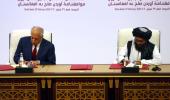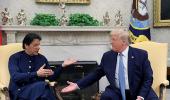US-Pakistan relations are poised to touch a qualitatively new level under the Biden administration, notes Ambassador M K Bhadrakumar.

Mark Twain is credited with the saying 'History never repeats itself, but it does often rhyme.' The echoes of history resonate as the new US administration prioritises the Afghan problem for policy review.
The highlight of the White House readout (external link) following a phone call by the new National Security Advisor Jack Sullivan to his Afghan counterpart Hamdullah Mohib on January 22 is Washington's intention to review the February 2020 US-Taliban agreement.
The White House sidestepped Afghan President Ashraf Ghani to convey this important message and the readout avoided any expression of support for the Ghani government.
History seems to be repeating.
Exactly ten years ago, then vice president Joe Biden was witness to a similar agonising Afghan policy review (external link) at the Barack Obama White House.
Bob Woodward's Obama's Wars recounts how Obama's 'war cabinet' was split down the middle with the security establishment and top White House political strategists locked in bitter infighting.
While the security establishment led by the generals and military chiefs -- General David H Petraeus, General Stanley McChrystal and Admiral Mike Mullen, and Obama's defence secretary, Robert Gates -- argued for a surge and a commitment to keep the deployment to Afghanistan for as long as it took to contain Taliban, facing them down was Biden who wanted the US to minimise its involvement and get out as soon as possible and invoked the lessons of the Vietnam war.
Eventually, the soldiers proved to be adept at public relations with General Petraeus defying a White House gag and prompting newspaper stories that Obama was going to lose them the war.
And Obama played safe and Biden's warnings went unheeded.
But history is not even rhyming this time around.
President Biden has thoughtfully picked a national security team whose loyalty to him is never in doubt.
Biden will have his way on troop withdrawal from Afghanistan.
Biden has been an early advocate of ending the war.
Secretary of State Antony Blinken broadly outlined Biden's thinking during his confirmation hearing (external link) at the Senate Foreign Relations Committee on January 19 when he said, 'We want to end this so-called forever war. We want to bring our forces home. We want to retain some capacity to deal with any resurgence of terrorism, which is what brought us there in the first place.'
But, he added, 'We have to look carefully at what has actually been negotiated. I haven't been privy to it yet.'
Blinken was referring to the annexes to the Doha pact that have remained classified.
Clearly, the forthcoming White House review of the Doha pact will examine the secret understandings reached between US Special Representative Zalmay Khalilzad and the Taliban interlocutors at Doha with Pakistan as the sole witness-cum-facilitator.
Conceivably, there could be an understanding regarding an interim government in Kabul replacing President Ashraf Ghani, which is linked to a ceasefire.
At any rate, Ghani shows signs of nervousness.
He's warned of 'severe' consequences in the event of an interim setup replacing his government in Kabul.
Ghani indignantly asked, 'Based on what authority are they talking about an interim government?'
Ghani is unnerved probably over an Al Jazeera interview (external link) on Thursday by Pakistani Foreign Minister Shah Mehmood Qureshi who expressed hopes for greater engagement with the new US government and urged Biden to follow up on the Afghan peace process and US troop withdrawal.
'I think they [Biden administration] should realise there is an opportunity in Afghanistan and they should persevere with what was initiated and not reverse things. Push them forward, because, after a long time, we have started moving in the right direction,' Qureshi said.
'Pakistan has done a lot, we have really bent backwards to create an environment to facilitate the peace process...'Qureshi added, 'They [White House] should be supportive of what, I feel, is a convergence of interests. Our approach, thinking, objectives and shared visions are very much in line with the priorities of the new [US] administration. And that convergence can be built further.'

Biden has enjoyed a warm relationship with the Pakistani leadership, civilian and military.
The friendly references to US-Pakistan relations by Defence Secretary Lloyd Austin at his US Senate confirmation hearing on Tuesday (external link) testify to it.
'Pakistan is an essential partner in any peace process in Afghanistan,' Austin said. 'Pakistan will play an important role in any political settlement in Afghanistan.'
'I certainly would like to see this conflict end with a negotiated settlement. And I think we are going to make every effort to ensure that happens,' Austin added.
'We need to see an agreement reached in accordance with what the president-elect wants to see. I think we want to see an Afghanistan that doesn't present a threat to America. So, focusing on some counterterrorism issues, I think in the future would be helpful.'
'I will encourage a regional approach that garners support from... Pakistan, while also deterring regional actors from serving as spoilers to the Afghanistan peace process...'
'Pakistan has taken constructive steps to meet US requests in support of the Afghanistan peace process. Pakistan has also taken steps against anti-Indian groups, such as Lashkar-e-Tayyaba and Jaish-e-Muhammed, although this progress is incomplete...'
'Many factors in addition to the security assistance suspension may impact Pakistan's cooperation, including Afghanistan negotiations and the dangerous escalation following the Pulwama attack."
Austin assured the US senate that he would continue to build relationships with the Pakistani military to 'provide openings for the United States and Pakistan to cooperate on key issues.'
Austin's effusive statements on the senate floor underscored the high importance Biden attaches to rebooting the US-Pakistan relationship.
CNN has reported that Khalilzad (external link) is continuing in his position as special representative.
Khalilzad enjoys excellent equations with the Taliban representatives at Doha and the Pakistani military leadership.
Ghani refused to meet him during a recent visit to Kabul.
Indeed, US-Pakistan relations are poised to touch a qualitatively new level under the Biden administration.
Last week, visualising this upward trajectory, at a talk at the Washington-based think-tank Wilson Centre and in a media interview, Dr Moeed Yusuf, the special assistant to the Pakistan prime minister on national security, said Pakistan can work as a bridge between the US and China in the evolving global order.
Ambassador M K Bhadrakumar, who served the Indian Foreign Service for more than 29 years, played a stellar role in beginning India's systemic dealings in Afghanistan in 1994.
On Rediff.com, Ambassador Bhadrakumar revealed how he undertook that most important and risky mission.
Feature Presentation: Aslam Hunani/Rediff.com











 © 2025
© 2025